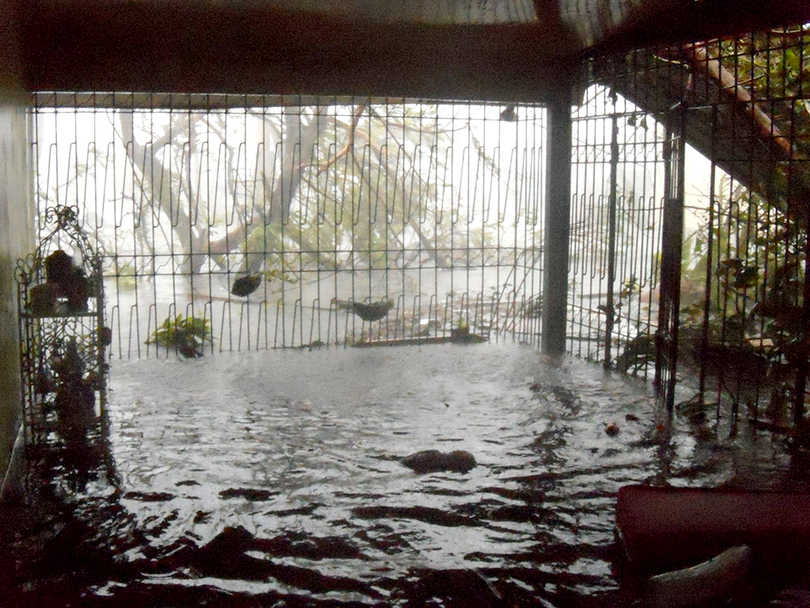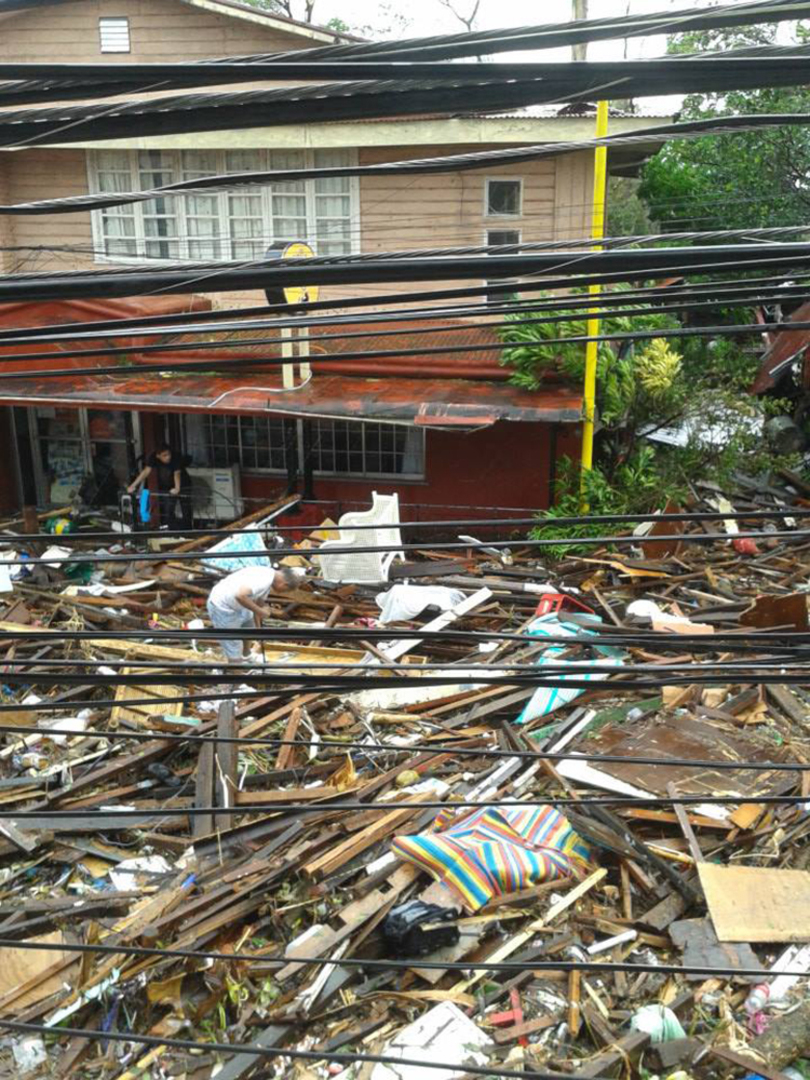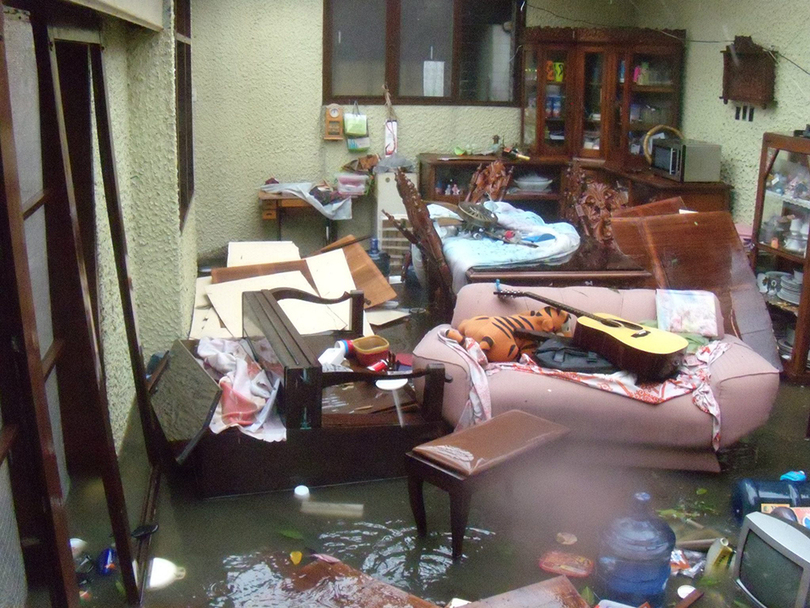Braving the storm: SU community reacts, comes together in aftermath of typhoon in the Philippines
CORRECTIONS: In a previous version of this article, the captions accompanying the photos stated the home belonged to Stephanie Bronfein’s cousin Miki. The house belongs to Miki’s boyfriend, Jayson Kristopher. The method through which Bronfein spoke with her cousin was also misstated. They spoke via Facebook. The state of Miki’s home after the typhoon was also misstated. Miki’s home was not destroyed. The person who received the text message from an unknown number was also misstated. Bronfein’s aunt received the message about her family. The Daily Orange regrets these errors.
When Typhoon Haiyan struck the Philippines on Friday, Stephanie Bronfein felt like her family was a world away.
She didn’t truly understand the severity of the situation until she took to Facebook to get in touch with family members who live in Tacloban, one of the cities hit hardest by the typhoon. Bronfein, a sophomore in the Bandier Program for Music and the Entertainment Industries, was met with both hope and devastation.
She saw hundreds of posts desperately, publicly declaring “I love you” and “I hope to hear from you soon” as the others, like Bronfein, struggled to reach their loved ones. And speaking to her cousin Miki on Facebook only confirmed what she felt when she saw photos of Miki’s house surrounded by debris.
“My cousin was describing it to me, where it sounded like people were stomping on the ceiling, waiting for it to cave in,” Bronfein said. “Everything smells terrible because of the dead bodies everywhere.”
So far, Bronfein said, her cousin found three bodies in the rubble near her home — they are unsure of what else, or who else, is underneath. Trees that lace the nearby mountains used to prevent people from seeing the ocean. They are now fallen, and the ocean is visible from all directions — a painful reminder.
“It’s hard for me to see these pictures because I’ve been there multiple times,” Bronfein said. “To see it now, it’s like, ‘This can’t be this town, this can’t be my family, this can’t be my friends.’”
The typhoon, called Yolanda in the Philippines, went down as one of the strongest in recorded history, reaching the same strength of a Category Five hurricane, Bronfein said. The storm “ripped the city to shreds” when it made landfall Friday, she said.
The sentiment of “just being alive” has kept many victims going, Bronfein said. But the reality of the storm is setting in for the survivors: Bronfein said some are left seeking food and water, as evidenced by the number of shops being looted.
“People are getting so desperate,” she said. “My cousin was just expressing how she’s afraid people are going to attack her house because they see she has electricity and food and four walls.”
After the catastrophe, Bronfein said, she didn’t hear from her family for days — not until her aunt received a text message from an unknown number stating that her husband, three children and three young grandchildren were safe.
—
Though Rob Hom only saw Typhoon Haiyan through his television screen, witnessing his mother and grandmother’s reactions to the storm made him feel helpless. He was born in America, but his mother, grandmother and aunts all grew up in the Philippines. The storm has tainted the memories of their homeland, he said.
Hom, a 2013 alumnus, grew up hearing stories about his mother and her sisters climbing mango trees when they were still living in the country. Hom said he planned to travel to the Philippines to visit where his mother grew up because he wanted to experience what life there was like.
Now, he sees those memories clash with the reality of the storm and has to face the difficult realization that those trees might not be there anymore.
“It’s those little moments that we take for granted,” he said, speaking about the family memories that have now been tarnished. “I’m guilty of it, too.”
He said the catastrophe has reaffirmed the pride he already felt in his nationality. If it weren’t for his grandfather, who left his job as a lawyer for a minimum wage job in the United States, he wouldn’t be here, he said. He said it’s the memories that we hold onto that preserve the cultures we represent.
“And that’s what I take pride in,” Hom said. “The fact that my mom grew up in the Philippines.”
—
There are currently six students studying at SU on visas from the Philippines, said Pat Burak, director of the Slutzker Center for International Services. Four out of the six students have confirmed that their families are safe.
Burak said she isn’t sure yet of what fundraising efforts may come together, but said past efforts included events where attendees could donate money to relief services such as the Red Cross, Doctors Without Borders and UNICEF.
“We’re trying to work with members of the community to see what they would like,” she said. “I’m willing to partner with anybody who wants to do any of those things, contribute my experience, contribute our networking potential. I’m not going to personally organize any event but I’ll help anybody who wants to do it, I’ll help in any tangible way I can.”
Interim Chancellor Eric Spina sent out a campus-wide email providing the Slutzker Center’s contact information for those who are concerned about loved ones.
Two people had contacted Burak as of Wednesday afternoon and she said she planned on meeting them later that day. She said possible avenues to contact loved ones include the U.S. Department of State, the American consulate in the Philippines and SU alumni in the Philippines.
“I’ll help in any way that I can,” she said.
Burak said students with no connection to the Philippines should be aware of the tragedy “because we’re one world.”
“It’s our obligation as a human being to help people in need,” she said. “And I think that all of us, fundamentally, no matter what religious faith we come from, what social political parties we come from, we fundamentally care about our brothers and sisters around the world.”
Sharon Li, president of SU’s Asian Students in America, said when the group first heard about the typhoon, its initial reaction was to ask “Is everyone OK?”
Li said when ASIA sees an event with some relation to Asia that could affect some students on campus, the group shows its support. The group previously donated to relief efforts for other natural disasters in Asia, such as the tsunami in Japan and the earthquake in China, she said.
ASIA is considering donating the funds from its Elements of Hip Hop show on Saturday to victims of the typhoon, Li said.
“Plenty of people have been affected by it, especially families, losing loved ones, losing their homes, not having enough food and just not having the proper necessities of life,” Li said. “With the funds that we raise and that we hope to donate, ASIA is hoping that it can help bring them back, give them hope again.”
Burak said the magnitude of the typhoon overwhelmed the relief the Philippines’ infrastructure could provide, leaving 630,000 people displaced and without food or shelter.
“I think there’s a humanitarian need for everyone to help,” she said, encouraging everyone with an extra dollar to put it toward relief efforts. “We are a country that has more — let’s help.”
She added that she and a number of other staff members in the Slutzker Center keep in close personal contact with international students after they graduate, making it a very personal experience when disasters strike in parts of the world where alumni live.
“They come back here to visit, they’re proud of being Syracuse University graduates, they live that connection every day of their life,” she said. “It’s up on their Facebook: ‘Syracuse University graduate.’ And that keeps the name of Syracuse University alive all around the world.”
“I think that our connection with the world is not just academic, it’s not just philanthropic, it’s very real people who are connected to our educational system,” Burak said. “We have people all around the world and I think that makes Syracuse even stronger and more vibrant players in helping out in the world when things like this hit.”
—Asst. News Editors Maggie Cregan and Alfred Ng contributed reporting to this article.
Published on November 14, 2013 at 2:19 am
Contact Annie: apalme05@syr.edu








